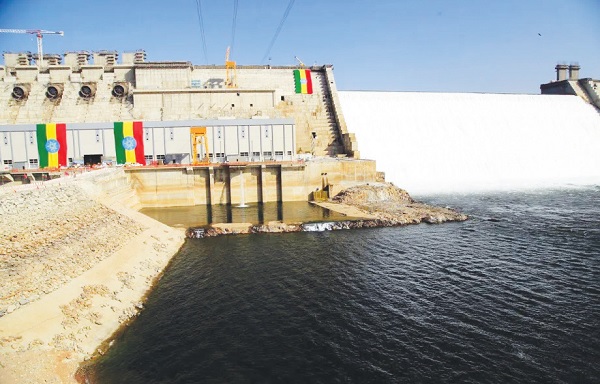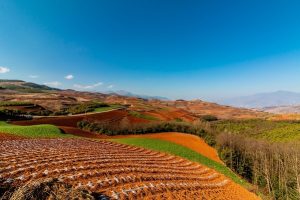
The topic may sound odd at face value but from policy perspectives, the construction of Ethiopia’s Grand Hydroelectric Dam which kick started in 2011 combines two sets of polices including Ethiopia’s Climate Resilient Green Economy Strategy (November 2011) and the Revised Foreign Relations Policy (2019) of the country. These two policy documents effectively bisect through all socio-economic polices of the nation and are mainstreamed in almost all development programs of the country.
It would be interesting to note that the CRGE and GERD were commissioned in the same year.
Accordingly, while GERD was designed in close consonance with the country’s need for renewable energy resources for its burgeoning industries and for lighting up its rural areas with carbon free electric power, the foreign policy of the country as the policy document states focused on five basic principles based on ascertaining Ethiopia’s national and international interests through bilateral and multi-lateral, equitable, inclusive and mutually beneficial relations., ensuring the sovereignty of the nation, resolving disputes between countries in a nonaligned manner, respect for global and regional treaties and agreements and resolving conflicts only in a peaceful manner.
Ethiopia’s diplomacy and foreign relations policy, according to the foreign relations document, firmly rests on its foreign policy of peace internally, at regional level and globally. History of Ethiopia’s peace keeping missions across the globe is a vivid testimony for its collective security initiatives and the quest for peace. This is so because Ethiopia can never be an island of peace whiles its neighbors or the entire region are in conflicts emanating from terrorist induced or ethic political conflicts. Ethiopia has never invaded any country but always remained a victim of recurrent wars by foreign invaders.
The reciprocity between the construction of GERD and Ethiopia’s efforts for peace therefore effectively fits into the country’s foreign policy in the sense that it would promote friendly and mutually beneficial sharing of hydropower resource from Abbay River with the lower riparian countries. There is more to this aspect of mutual economic development. The dam challenged the status quo and veto power established by colonial, unfair and monopolistic treaties of 1929 and 1959 paving the way for a greater possibility of modern economic integration between COMESA members who are now also members of AfCFTA in line with Agenda 2063.
The Nile Basin Cooperative Framework was designed (1997- 2010) as an alternative to these treaties to also include upstream countries who are also stakeholders to the waters of the Nile. Unfortunately Sudan and Egypt rejected the initiative rigidly sticking to what they called their historical right as exclusive owners of the waters of the Nile. This colonial mindset till prevails today.
Ethiopia considers GERD’s contribution to peace in the context of empathy, cooperation and joint ventures on the Nile as a tool for pacifying the sporadic conflicts in the Horn of Africa. Ever since the Declaration of Principles signed between the leaders of Ethiopia, Sudan and Egypt in 2015, Ethiopia has upheld the major foreign policy principles and firmly supported the role of AU in promoting genuine negotiation between the three countries while Egypt was busy discouraging efforts so far made by combining lobbying at the corridors of world powers and fanning misinformation with threats and attempting to twist Ethiopia’s arms to sign unreasonable agreements not in the jurisdiction the country.
Ethiopia believes in the cardinal principles of reciprocity, interconnectedness, mutual respect, quest for unity in the battle against poverty in the Horn of Africa. For instance, Egypt who is at the same time wasting a huge amount of Nile water to evaporate in the desert may not be interested in power supply for other countries because already more than 90 percent of its population have access to electric power.
It is to be noted that the prevalence of conflicts in Africa and more particularly in the eastern part of the continent partly emanates from fights from survival instincts on scares resources that are mostly located on common inland or international boundaries. For instance conflicts over forest resources like fuel wood and conflicts in Ethiopia’s semi-arid are largely connected to abject poverty.
Besides, weak infrastructure, widespread insecurity, frequent droughts and limited livelihood options, poor health services, unemployment and other social problems inhibit full scale development efforts in Africa
As repeatedly emphasized, more than 65 percent of the Ethiopian population, largely in the rural areas have no access to electricity while poor women in urban and rural areas of the country had to trek for almost half a day to fetch firewood and are also forces too use bio-fuel sources like cow dung which release a huge amount of carbon.
According to Dr. Mehari Maru from Institute for Peace and Security studies of the Addis Ababa University (volume 1 issue 1, 2020), close to 90 percent of the Nile waters have so far not been used for hydropower while more than 80 percent of the riparian countries have no access to electric power as compared to Egypt 90 percent of whose populations enjoy hydroelectric power.
Besides, at the geopolitical level, it is to be noted that Ethiopia is located at the cross roads of rivalry between various powers that compete to exert their influence on countries of the Horn of Africa to ensure their strategic interests. That is why Ethiopia puts a greater emphasis for sustained peace with the neighboring countries. That is why Ethiopia lost no time over the previous year to make peace with Eretria, worked for peace in Somalia and South Sudan and recently pioneered in seeking urgent solution to the crisis in Sudan. Why? Because, Ethiopia can never be at peace when civil war is raging in the neighboring countries.
Surprisingly enough, Sudan and Egypt tried to exploit the recent ethnic based conflicts in Ethiopia to weaken the negotiating capacity of the country thus forcing the nation into hasty submission to their egoistic interests. Today, Sudan is engulfed in a political turmoil which jump started from the economic crisis the country is facing and made a grave mistake with wrong timing by encroaching and occupying Ethiopia’s territories close to the border areas. All told, how can the completion of GERD contribute too peace in Africa? It would certainly be appropriate to consider several factors.
Dr. Mehari argues that the Nile and GERD can be an integrative opportunity for creating interdependence among the riparian countries. GERD and any other hydroelectric projects on the river could be considered as integrative factors and could effectively enhance opportunities for geopolitical interdependence.
Bilateral cooperation in promoting regional eco-tourism on the lakeside to be created by the huge dam provides not only a cheaper natural entertainment area but would also help to promote apathy and wider friendship between the peoples of the three countries at times of hard weather from scorching sun.
The artificial lake to be created by GERD could become a center for rowing competitions at international level. Sports like water polo and other aquatic sports bring together sportspersons from Ethiopia, Sudan and Egypt as well as renowned international athletes across the world.
GERD should never be perceived either as a threat or a bone of contention among the three countries. It can certainly be a transit recreational hotspot for tourists who wish to extend their visits to other African countries.
By promoting the spirit of economic, cultural, scientific and technological Pan Africanism, GERD becomes a center for African power integration, cultural exchange and a research and learning center for African scientists working on hydrology and aquatic resources.
Business persons in the three countries and the rest of Africa can engage in developing world class hotels in which conference tourism can flourish bringing together the African intelligentsia to discuss on Africa related socio-economic, political and scientific issues.
For instance, investments in fishery and lakeside horticulture projects by Ethiopian and African investors will make GERD an attractive African center for marking and exporting quality vegetable products highly demanded in the Middle East and the Persian Gulf countries.
Undoubtedly, GERD could be a venue for the future African political integration based on the development of Africa’s economic integration could begin.
This however does not mean that everything could come through a red carpet. The utilization of resources from GERD demands shifting the focus from sabre rattling to peaceful negotiations and phasing out from egoistic and narrow national interest to cooperation on common needs for peace and development in the Horn of Africa. GERD will ultimately fulfill the AU and global standards under which the power of mutual development overrules chaotic competition and egocentric and selfish mindset.
Recent events in the Horn of Africa vividly indicate that while the lower riparian countries are grappling with their own internal challenges, GERD is really expected to be a unifying factor for the preparedness to be made by Ethiopia, Sudan and Egypt to ascertain lasting peace in the region for the benefits of their peoples. As stated much earlier, advocating for peace and peaceful utilization of GERD and Abbay is a matter of policy priority of peace for Ethiopia.
Despite internal and external conspiracies and threats on bombarding the dam, Ethiopia is at the threshold of competing the dam which indeed the pride of Africa just like the Ethiopian Airlines Group.
Strong leadership and public commitment has resulted in the completion of this gigantic project which was unthinkable about 15 years back. The nation is yet to develop more renewable energy resources including nuclear power. This dam is not meant for adverse competition but cooperation and not for war by sustainable peace.
BY SOLOMON DIBABA
THE ETHIOPIAN HERALD WEDNESDAY 14 MAY 2025




